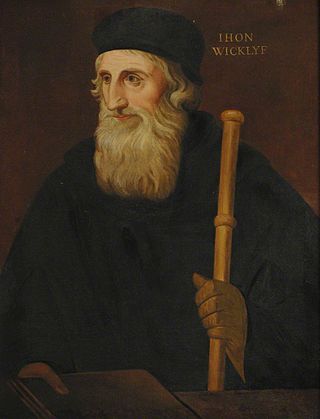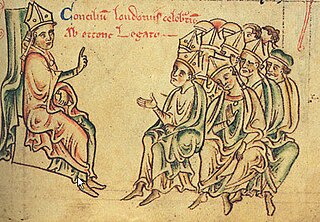
John Wycliffe was an English scholastic philosopher, Christian reformer, Catholic priest, and a theology professor at the University of Oxford. Wycliffe is traditionally believed to have advocated or made a vernacular translation of the Vulgate Bible into Middle English, though more recent scholarship has minimalized the extent of his advocacy or involvement for lack of direct contemporary evidence.

Lollardy was a proto-Protestant Christian religious movement that was active in England from the mid-14th century until the 16th-century English Reformation. It was initially led by John Wycliffe, a Catholic theologian who was dismissed from the University of Oxford in 1381 for heresy. The Lollards' demands were primarily for reform of Western Christianity. They formulated their beliefs in the Twelve Conclusions of the Lollards. Early it became associated with uprisings and assassinations of high government officials, and was suppressed.
Year 1382 (MCCCLXXXII) was a common year starting on Wednesday of the Julian calendar.

The Council of Ephesus was a council of Christian bishops convened in Ephesus in AD 431 by the Roman Emperor Theodosius II. This third ecumenical council, an effort to attain consensus in the church through an assembly representing all of Christendom, confirmed the original Nicene Creed, and condemned the teachings of Nestorius, Patriarch of Constantinople, who held that the Virgin Mary may be called the Christotokos, "Christ-bearer" but not the Theotokos, "God-bearer". It met from 22 June to 31 July 431 at the Church of Mary in Ephesus in Anatolia.

The Third Council of Constantinople, counted as the Sixth Ecumenical Council by the Eastern Orthodox and Catholic Churches, and by certain other Western Churches, met in 680–681 and condemned monoenergism and monothelitism as heretical and defined Jesus Christ as having two energies and two wills.

Nestorius was an early Christian prelate who served as Archbishop of Constantinople from 10 April 428 to August 431. A Christian theologian from the Catechetical School of Antioch, several of his teachings in the fields of Christology and Mariology were seen as controversial and caused major disputes.
William Courtenay was Archbishop of Canterbury (1381–1396), having previously been Bishop of Hereford and Bishop of London.
The Euchites or Messalians were a Christian sect from Mesopotamia that spread to Asia Minor and Thrace. The name 'Messalian' comes from the Syriac ܡܨܠܝܢܐ, mṣallyānā, meaning 'one who prays'. The Greek translation is εὐχίτης, euchitēs, meaning the same.
John Purvey was an English preacher, reformer, and sometime disciple of John Wycliffe. He is popularly associated with the "Later Version" Middle English translations of at least the New Testament of the Middle English Bible popularly associated with Wycliffe.

Syriac Christianity is a branch of Eastern Christianity of which formative theological writings and traditional liturgies are expressed in the Classical Syriac language, a variation of the old Aramaic language. In a wider sense, the term can also refer to Aramaic Christianity in general, thus encompassing all Christian traditions that are based on liturgical uses of the Aramaic language and its variations, both historical and modern.

Synods of Westminster were certain of the more important ecclesiastical councils held within the present bounds of London. Though the precise locality is occasionally uncertain, the majority of the medieval synods assembled in the chapter-house of old St Paul's, or the former chapel of St Catherine within the precincts of Westminster Abbey or at Lambeth. The councils were of various types, each with a constitutional history of its own. Before the reign of Edward I, when convocation assumed substantially its present form, there were convened in London various diocesan, provincial, national and legatine synods; during the past six centuries, however, the chief ecclesiastical assemblies held there have been convocations of the province of Canterbury.

Nilus of Sora was a Russian Orthodox monk, spiritual writer, theologian, and the founder of the Sora Hermitage. He is best known as the founder of a tendency in the Russian Orthodox Church known as the non-possessors (nestyazhateli) which opposed ecclesiastic landownership. The Russian Orthodox Church venerates Nilus as a saint, marking his feast day on the anniversary of his repose on 7 May.
The Friends of God was a medieval mystical group of both ecclesiastical and lay persons within the Catholic Church and a center of German mysticism. It was founded between 1339 and 1343 during the Avignon Papacy of the Western Schism, a time of great turmoil for the Catholic Church. The Friends of God were originally centered in Basel, Switzerland and were also fairly important in Strasbourg and Cologne. Some late-nineteenth century writers made large claims for the movement, seeing it both as influential in fourteenth-century mysticism and as a precursor of the Protestant Reformation. Modern studies of the movement have emphasised the derivative and often second-rate character of its mystical literature, and its limited impact on medieval literature in Germany. Some of the movement's ideas still prefigured the Protestant reformation.
Heresy in Christianity denotes the formal denial or doubt of a core doctrine of the Christian faith as defined by one or more of the Christian churches.

John Bokyngham was a medieval treasury official and Bishop of Lincoln.
Saint Ephraim of Antioch, also known as Saint Ephraim of Amida, was the Patriarch of Antioch, and head of the Greek Orthodox Church of Antioch, from 527 until his death in 545. He is venerated as a saint in the Eastern Orthodox and Catholic Churches. His feast day is 8 June.
Nicholas [of] Hereford was an English Bible translator, Lollard, reformer on the side of John Wycliffe, Fellow of The Queen's College, Oxford and Chancellor of the University of Oxford in 1382. He was a Doctor of Theology, which he achieved at Oxford University in 1382.

Luke Chrysoberges was Patriarch of Constantinople between 1156 and 1169.
John Aston or Ashton, was one of John Wycliffe's earliest followers.
The 1382 Dover Straits earthquake occurred at 15:00 on 21 May. It had an estimated magnitude of 6.0 and a maximum felt intensity of VII–VIII on the Mercalli intensity scale. Based on contemporary reports of damage, the epicentre is thought to have been in the Strait of Dover. The earthquake caused widespread damage in south-eastern England and in the Low Countries. The earthquake interrupted a synod in London that convened in part to examine the religious writings of John Wycliffe, which became known as the Earthquake Synod.









